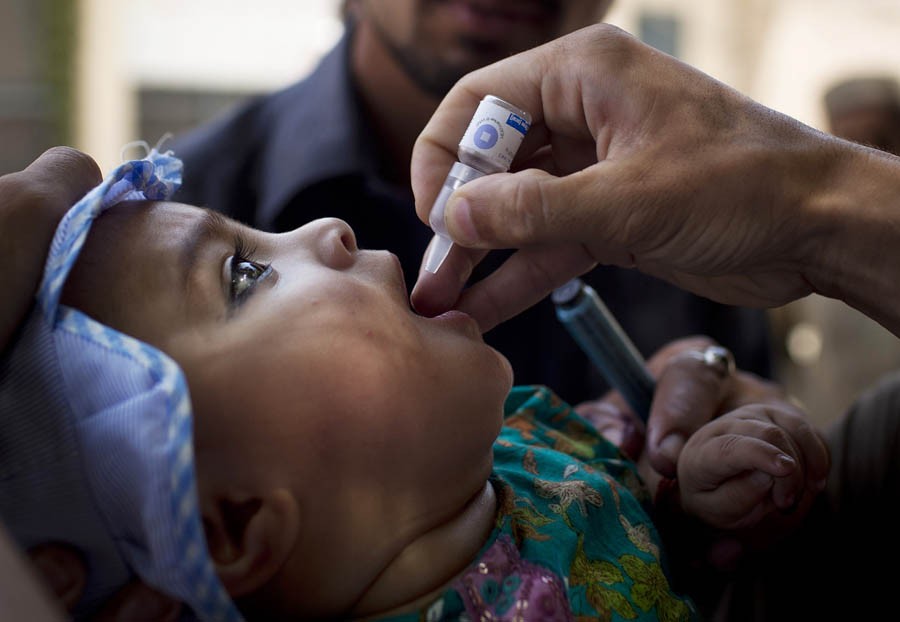
Leaving even a single child unvaccinated may make the entire community vulnerable to the disease

As the sun rises overhead in the midst of day, Khayal Muhammad; a young man with a limp in left leg, accompanied by a team of polio workers, knocks at a door in the dusty Afghan refugee camp, 55 kilometres from the city of Mianwali.
"Have the children returned?" he asks politely from outside. The barely-there wooden door, with a piece of cloth hanging in front, opens with some noise. A man in his mid-40s smilingly appears. Muhammad holds a brief discussion with the man before he disappears behind the curtain. He returns holding his two children in his arms. The team pumps two drops of oral vaccine in their mouths and leaves after exchanging greetings.
Muhammad is a polio survivor who lives in the refugee camp with his family, comprising seven siblings, after migrating from Afghanistan more than 20 years ago.
"In the 1990s my parents migrated from Afghanistan. They left all the belongings behind as they were in a hurry to leave due to the war. They rushed to the border and were allowed by the Pakistan government to settle down in this camp," he recalls.
In the wake of Afghan refugees’ repatriation to Afghanistan, there is a high possibility that polio teams may miss children thus leaving them vulnerable to the polio virus. Set up in 1990s, the sprawled-out camp was once one of the biggest in Pakistan housing 100,000 refugees.
Today, though the population has dropped to approximately 38,000, challenges still remain. One of these is maintaining an overall positive environment so that vaccination activities, including anti-polio efforts, can continue unhindered until every child is vaccinated.
"There are so many children in the camp who cannot be vaccinated when team pays their first visit", says Muhammad who joined the force of social mobilisers to protect children from a lifetime of disability. "I go house-to-house to confirm the availability of children who are not available during the first visit and inform polio teams if the child has returned. If the family is new to the camp, I accompany teams to the house for vaccination so that no child remains unvaccinated".
The Afghan camp reported its first polio case in March 2013 when a three-year-old girl was diagnosed. "It has been very rightly said that women and children are the most likely victims of emergencies, be it a natural disaster or conflict. No one can understand this pain more than me," says Muhammad.
"When I was a child, health facilities were not available. Polio campaigns were not held door-to-door. I missed my routine immunisation vaccination. At the age of less than two years, I suffered paralysis, which was later confirmed to be polio," he says.
"I grew up in Pakistan with disability, and it was very difficult. Today, I am 26-year-old. I am trusted and respected by all in the camp because I am related to many in the camp. Their trust in me reduces the risk of any child being missed in the camp, be it a guest or local" Muhammad reassures.
"I fully support polio teams in the camp. Being a local, I guide them to homes and help them locate children who have missed their vaccination," says Muhammad. He explains that despite the fact that walking is difficult for him, he considers it his responsibility to find unvaccinated children in the camp, whether they are playing or sleeping, and ensure that they are given vaccinations.
The vaccination of children living in high-risk conditions is one of Punjab’s challenges. When a child is left unvaccinated, not only are they vulnerable to the virus but also, they may affect other children in the community.
Mianwali shares a border with Khyber Pakhtunhwa, which is a polio reservoir and is frequently visited by Afghan refugees. The refugees mostly travel to their homeland using Tola Bangi Khel and Darra Tung routes in Essakhel, a sub-district of Mianwali. After crossing these points, they enter Khyber Pakhtunkhwa and then travel to their homeland across the border into Afghanistan.
Since the beginning of 2016, 2.5 million children were vaccinated by mobile teams accompanied by social mobilisers in high-risk union councils such as Kot Chandana during polio eradication campaigns.
In 2016, Punjab reported no polio case, but environmental samples collected from various sites in South Punjab, as well as Lahore and Rawalpindi, indicate transmission of virus from Peshawar and Karachi. The transmission provides ample evidence that there are pockets of missed children who are on the move across the country.
Children on the move due to economic reasons, especially during cultivation or harvesting season, are a high priority of the polio eradication programme.
The strategies set by the programme focus on systematically identifying and mapping all mobile, migratory, nomadic and internally displaced populations in Pakistan with a view to ensuring that these populations are included in the plans.
In Punjab, over 180 social mobilisers, like Muhammad, are always working to ensure that polio vaccination’s frontline workers reach every such child and provide them the much needed vaccine, free of cost, as per their inborn right.
"To completely eradicate polio, it is critical that every single child gets two drops of vaccine every time it is offered," says Muhammad.